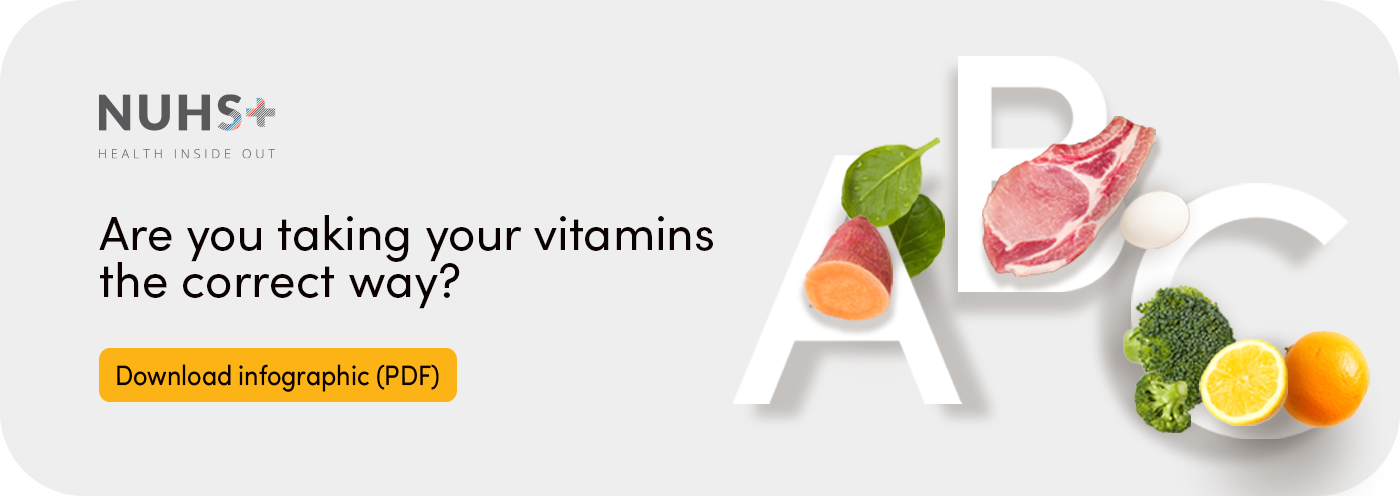Published on 28 January 2024
Vitamins are essential for the body to function properly — but this doesn’t mean you should automatically start loading up on supplements.
The term “vitamins” was coined when Dr Casimir Funk, a Polish biochemist was studying certain properties in food that seemed to prevent nutritional diseases such as beri-beri (Vitamin B1 deficiency) and scurvy (Vitamin C deficiency). This class of organic compounds seemed “vital to life”, so he named them “vitamines” — a term that has evolved into what we now know as vitamins.
Both vitamins and minerals are micronutrients which are needed in small amounts for our bodies to function properly. The 13 essential vitamins: Vitamins A, C, D, E, K, and the B group of vitamins (B1, B2, B3, B5, B6, B7, B9, B12), are found in organic sources such as plants and animals, while minerals are inorganic elements that originate from the earth and water. Both vitamins and minerals play specific roles in bodily functions, and their corresponding deficiencies are linked to a range of health issues, including greater susceptibility to illness due to a weak immune system.
Who should take vitamin supplements?
Ms Joyce Ho, Senior Pharmacist, Alexandra Hospital (AH), shared that while most people can get the necessary vitamins from their diets, those with certain medical conditions — such as malnutrition and gastrointestinal disorders — may need vitamin supplementation. In addition, vitamins may interact with medications and lead to unwanted outcomes such as reduction of medication efficacy.
Lifestyles and life events also have a role to play in whether you require vitamin supplements. “Pregnant females for example, would require supplements such as folic acid (Vitamin B9), required for healthy brain and spine development of the foetus. Vegetarians and vegans are at greater risk of developing Vitamin B12 deficiency due to their plant-based diet since it is mainly present in foods of animal origin. Plant-based foods do not naturally contain Vitamin B12,” said Ms Ho.
Factors such as an unbalanced diet and excessive alcohol consumption can affect the body’s ability to absorb certain nutrients. For example, excessive alcohol consumption can lead to liver damage, thus affecting the normal function of our liver. This can in turn affect the production of bile fluid by the liver cells, which is supposed to help us to absorb fats and fat-soluble vitamins optimally.
When consuming vitamin supplements, it is important to note the difference between fat-soluble and water-soluble vitamins. While excess water-soluble vitamins (B and C) are passed out in urine, fat-soluble vitamins (A, D, E, K) are stored in the liver, skeletal muscles and fatty tissue. This means that water-soluble vitamins need to be replenished regularly, while excessive intake of fat-soluble vitamins over a prolonged period can lead to a build-up — potentially reaching toxic levels.
It’s best to consult a medical professional if you’re unsure of whether you need supplements.
Examples of some factors that may cause vitamin deficiencies
Life events
|
Dangers associated with vitamins
Like how certain foods may interact with medications, certain vitamins and medications may interact and lead to adverse outcomes. For example, Vitamin A refers to a group of chemical compounds called retinoids. Patients who are on prescription medicines that are synthetic retinoids such as Acitretin and Isotretinoin (medications used for acne, skin disorders and skin cancers) and Vitamin A supplements are at increased risk of experiencing Vitamin A toxicity (Hypervitaminosis A). Ms Ho cautioned that Vitamin K (which is important for clotting of blood) counteracts the effects of Warfarin, a blood-thinning medicine commonly prescribed to prevent blood clots from forming or getting bigger.
It is advisable to consult your doctor or pharmacist before consuming supplements such as vitamins, especially if you are taking medications. If you suspect you are experiencing a severe negative reaction or vitamin overdose, see a doctor or visit the nearest A&E immediately. Here are some common misconceptions related to vitamins:
Myths about vitamins
More is better
It’s possible to overdose on vitamins, which can lead to toxicity and serious side effects, including liver injury. It's essential to understand the Recommended Dietary Allowances (RDAs) for common vitamins, ensuring a balanced intake for optimal health.
Vitamins can prevent or treat diseases
This misconception is commonly associated with Vitamin C, which supports the immune system but does not prevent people from catching colds. Similarly unproven, are other claims that taking Vitamin A and E supplements can prevent certain cancers.
Everyone needs supplements to get their vitamins
Most people do not need to take supplements. For most individuals, a healthy and well-balanced diet would provide the necessary vitamins.
Vitamins from organic sources are better
There is no evidence to support that vitamins from organic sources are more effective than synthetic ones. However, it is still recommended to get your vitamins from food, as they are accompanied by many other beneficial nutrients, including antioxidants that aren't in most supplements.

In consultation with Ms Joyce Ho, Senior Pharmacist, AH.




.png?sfvrsn=8a80b0e7_1)